- Home
- Sherwood Smith
Sasharia en Garde Page 9
Sasharia en Garde Read online
Page 9
Once again he made me laugh, and my annoyance vanished. I couldn’t stay mad at him. Zathdar already knew my situation was unfair, and of course he had a price on his head, too.
So I said, “There’s a reward offered for laying me by the heels whether I’m on land or at sea, isn’t there?”
He spread his hands.
“Well, on land, I’m my own person, so to speak. I’d rather call the shots—” The words came out in English. “I’d rather be on my own.”
“To find your father?” he asked gently.
I lifted my gaze—and met his blue eyes straight on.
What is it about the mirroring of gazes? Eyes are just eyes, circles within circles. You meet people’s gazes all your life. Then, one moment you look across the table out of surprise or question or maybe even a little challenge, and there are these eyes. Your nerves zing and prickle, leaving you intensely aware of your heartbeat, your breathing, your toes crunched in your shoes, your damp palms. Distance is so relative. Whether the other person is a foot away or across a crowded room, you have fallen into intimate space.
I flicked my gaze up to the glittering gold embroidery on his headband. No intimate space here, noooooo.
I said to the fringes, “I have no idea if my father’s even alive. No one will tell me.”
“He vanished. That’s all anyone can tell you.” Zathdar snapped his fingers. “The Ebans seem to think you know where he is.”
“I can’t help that.” I shrugged and studied the map of Sartor just beyond his shoulder as if a professor was about to slap a final exam before me.
“There’s another matter. Something many of my crew are in favor of, by the way, as nearly all of them are exiles for one reason or another. Far too many are new, as the unrest spreads. Sooner or later someone’s going to ask your intentions, so it might as well be now, and by me.”
“I’m listening.” I moved away from the table and confronted the map, poring over it.
“I thank you for that.” I could hear his smile in his voice. “But I was hoping you’d take that as an invitation to talk.”
Now even his voice sent prickles through me. This was the last thing I needed. Second to the last, I amended, backpedaling mentally. Worst thing? Capture by Canary’s goons. But the second-to-the-last thing I needed was any kind of chemistry with a pirate. Especially one who had the worst taste in colors I’d ever known, even in the mega-geek world of graduate school. That’s right, Sasha, make yourself laugh. Use laughter as a defense. If you can keep laughing, it’s just a silly chemical thing, here today, gone tomorrow.
“Rumors have to be crossing the country now, however garbled. If you were to raise your family’s banner, many people would flock to it.”
That surprised me enough to flick a sideways glance, but I stopped at the bandana. “I don’t have a banner.”
“You do, too.”
“It’s just a blanket. And anyway I have no legal standing.”
“You have, let us call it, a symbolic standing in the eyes of many people who want the Zhavalieshins back on the throne.”
“So in place of my dad I serve as a figurehead for civil war? No, I hate that, I’m sorry. I don’t mean to sound like I’m casting any aspersions here—blood and guts after all was your career choice—but if you’re hinting you’d like me to join your fleet here under the Zhavalieshin banner, well, in a word, no. I won’t stand by and let my family name be an excuse for someone wanting power to draw brothers and sisters and mothers and fathers and kids, even, to go marching to their deaths. Or sailing to their deaths. Because that’s what civil war is, when you strip out the rhetoric about who’s right and who’s wrong.” I winced, suddenly realizing that I was giving A-double-attitude to a pirate captain on his own ship. One who could toss me in the brig, and who would stop him?
But he did not sound angry. “Fair enough. Then you must be set down on land as soon as we can. First, though, there’s a little matter of a blockade to run.”
“Oh. Blockade. Right. But . . . we aren’t exactly racing.”
“That’s because the blockade will be raised guarding the main harbors, on the other side of the kingdom. And if the king issued the order, you can be sure the orders were sent by magic.”
I remembered those magical message boxes. Like email, only with real paper. “Right.”
“So we’ll make speed soon as we get a favorable wind, but we do need to be ready for anything. Though I have an idea.”
“I suppose you can’t land me on the coast somewhere?”
“Far too dangerous.”
I had a vague memory of my father being told the same thing, back in our smuggling-boat days: lee shore winds, rocks, cliffs . . . Khanerenth’s coastline outside of the harbors was terrible on ships.
“Thank you.” I turned toward the cabin door. He did not stop me.
Outside, I found that tall young woman with the blond hair.
“I’m Gliss,” she said, before I could speak. “Captain of the tops, starboard. The mates invited the sail captains to mess. And you. If you’ll come.” She sounded gruff, almost as if she didn’t want me to, but her eyes were more brooding than angry.
“Thank you,” I said. “Lead on.”
Chapter Ten
“Crap. Crap. Crap. Crap,” Sun muttered with each painful step.
“Shhh.” The admonitory hiss blended in with the patter of the rain.
Lightning flared, revealing reproach in Silvag’s wet face. Sun realized she’d been speaking instead of thinking. But oh, her feet hurt so much, so very much—
Another flare, farther off; Silvag held a hand flat toward the ground. Sit.
She sat right where she was, mud squelching under her butt. She didn’t care. It meant her feet could rest.
The next flare brought a long, rumbling judder of thunder across the sky, and the patter became a roaring downpour. Folgothan splashed down next to her, his bad leg held straight out. Leaning close, she muttered, “Sorry.”
He shook his head, drops flying off his gray hair. She’d apologized at least fifty times by now, but the sight of his pain filled her with fresh remorse.
Haxin, the ferrety one, had been looking around carefully during the flashes. Now he leaned close. “He’s gone ahead. If it’s clear, we’ll have a cart back.”
He didn’t mean clear of enemies, though that was implied. Silvag had already explained that his wife had expected him to come home with some money. She had said she didn’t care how. He didn’t know how serious she’d been.
Wincing and grimacing, she peeled off her socks and set her feet out in the warm rain. The sting slowly diminished, and she almost nodded off into sleep when she heard Haxin splash upright, hand on his sword.
“It’s us,” came Silvag’s low voice.
Moments later hands helped Sun to rise. She picked up her shoes and socks, walking barefoot through the mud. Little stones jabbed into her feet, internal lightning flares of agony, but she thought of Folgothan and kept silent. Presently they reached an old cart, pulled by a patient horse. She sat on the lowered ramp, her feet hanging over. Folgothan sat next to her, swinging his bad leg up. Haxin clambered up behind them, sitting by Silvag on the buckboard.
Sun leaned her cheek against the rough wood of the cart and this time she did fall into an uneasy slumber, waking stickily when the cart rolled to a stop. The rain had ended.
She hobbled behind Folgothan, whose breathing was a constant, painful hiss in and out. They entered a low cottage built in a jagged sort of rectangle, obviously each room added at different times, sized according to what materials they’d managed to scrounge.
They passed through two or three small, scrupulously tidy rooms. At last she was pointed to a rough-and-ready loveseat, cushioned by mismatched, homemade pillows. She sank down gratefully, but stood right up again. “I’m wet,” she said in dismay.
A square-faced woman her own age advanced, thin from worry and under-eating. Her expression was forbidding, but af
ter Sun’s exclamation she said politely enough, “Never mind that. Those pillows dry out nice.”
Sun sank down with a sigh. “Here.” She twisted off her opal ring and handed it to the woman.
“For?”
“The household, with my gratitude.”
Sun watched the woman’s brow clear, and relief pooled inside her. She’d remembered right. People in this country had different attitudes toward work, toward charity, toward a lot of things, than Sun had grown up with in L.A. Silvag’s wife might have resented it if Sun had expected her to use the ring to barter for princess things, but a donation to the house was acceptable.
“I’m Plir,” the woman said with cautious approval.
“Atanial.” The old king had declared that “Sun” was not an appropriate name for a princess. At home when she’d changed her name, it meant paperwork, fees, and standing in long lines at City Hall. Here, a king could change names on a whim. He’d decided that she’d be Atanial, a Sartoran name.
“My daughter is fixing you a bath, your highness. We’ll have those clothes through the frame while you soak, and then planning. But first here. Lark, bring it in.”
A teenage girl stood in the doorway. Lark was short and strongly built like her mother, with her father’s jug ears. Sun noticed she wore her braids firmly back behind them, with no attempt to hide the ears. If anything, the braids framed them. That won Sun over at once. Lark had spirit.
She came in, carrying a mug of listerblossom tea, which Sun took with a word of thanks.
Before long she felt human again. The ache of her feet receded to twinges whenever she flexed her toes. Her clothes were still wet, but the evening’s warmth mitigated the dampness.
The men joined Sun and Plir in another room with a big table. Haxin was busy repairing what looked like a piece of harness gear. Folgothan sat back, eyes closed, hands loosely clasped around a mug of listerblossom tea. This tea was a pain reliever.
As Lark silently set out bowls and spoons, the others all faced Sun. “Your highness,” Silvag began, after a look sideways at his silent companions. “What is it you wish to do?”
“Get to Steward Eban.”
Silvag and Plir exchanged a glance—each obviously reading the other for cues—then Plir said, “When?”
“Whenever it’s safe.” Sun hoped tiredly that would be in a week. Except these people would be scrounging extra food for a week.
“They’re watched all the time,” Silvag muttered.
Lark eyed the grown-ups. “I’m the only one who goes through. No one heeds me.”
Sun regarded her, hesitating.
“Question?” Plir prompted. This off-worlder princess might have abandoned them for twenty years, or she might not have been able to get back. She was withholding judgment.
Sun said, “If the king’s people don’t heed you, it means they see you. Or are you able to get by them unseen?”
Lark grinned. “It was the first, early on. Nobody looked twice at a girl coming round to sell eggs in a basket. Our one thing is our hens, see. They’re all good layers. But we can’t live on eggs. So I sell ’em. Or trade, more like. Anyways, now I think I know where the spies be.”
“When would you suggest we go there?”
“Tonight,” Lark said promptly. “It’s not far.”
Sun winced down at her feet.
“I have some salve, and we could wrap ’em tight,” Plir offered.
Sun heard that as a hint that while visitors were fine for a short time, they would age as fast as old fish. She forced herself to nod, and to rise. “Thanks. Sooner done, sooner no one worries.”
Nobody argued with that.
o0o
Afterward, Sun—Atanial—insisted the less said about that trip the better. Yes, her feet had been wrapped after a liberal slathering with salve. The blisters still hurt and her bones ached.
But for all that, the walk was indeed not far. She learned that Silvag had settled outside of the city of Vadnais because his duty rotation back in the old days had him spending five days in the guardhouse, with two days off. And after he lost his job, the house was the only thing they had, so the family perforce stayed there. Steward Eban had moved to the outskirts of the city when she was dismissed from the royal palace. She’d expected to live relatively cheaply and in obscurity, and indeed it was that way for a time, but over the past few years she’d become the central repository for messages, reports and complaints about the outrages of Canardan’s adherents.
Lark led them by a circuitous route, keeping up a running stream of assurances that this hill was easy, that stream shallow, and it wasn’t much farther.
The two middle-aged folks reflected on what a strong, energetic young teen regarded as easy as they shuffled onward, the rain sometimes heavy, sometimes light, but always making a sloggy mess for their feet.
But at last Lark said, “There it is.”
Silvag looked around, decided it was safe, and vanished into the darkness. Lark led the way over a gentle hill between carefully tended fruit trees and down through fragrant border shrubs to another long, low house built much like Silvag’s.
She and Sun crossed the kitchen garden, past the grape vines, and stepped onto a porch entrance where the boots and coats were kept during winter.
“Oh, oh, oh! Princess Atanial.” A short woman with silver flyaway hair bustled up. “Is it truly you, highness?”
“Kreki.” Sun—no, Atanial. She would have to get used to her name as Math’s wife again, and all the assumptions (and the responsibility) the name implied. “Oh, it’s good to see you.”
She threw her arms around the smaller woman and hugged her, then they stepped back and studied one another. Kreki, blushing at being hugged by a princess, turned her head to call, “Dinner! Anything that can be warmed, and some berries and cream?”
“Sounds wonderful,” Atanial vowed with passionate sincerity, her stomach growling.
In the background two servants began taking down dishes and wrapped food, the third servant vanishing through the opposite door.
Atanial turned back to Kreki, whose round face had aged. Her dark eyes were wide and alert, her blond hair now silver. She was stouter, but still moved like a guided missile.
Kreki found Atanial as beautiful as ever, her hair the same wheat color, the fine skin of her face softened by time over spectacularly handsome bones. “All these years.” Her brow puckered.
Atanial spread her hands. “Mathias made me promise to stay. But he never came back for us.”
Kreki Eban touched her lips and glanced toward Lark, who stood in the corner, smiling with the peculiar mix of smugness and uncertainty that characterizes teens who think they did something clever, something adult—but the adults might still turn on them.
When Kreki nodded slightly, Atanial realized that their coming this night had some special significance.
Kreki said, “Would you honor us by stepping into the pantry? I’m afraid that’s where we have our meetings.”
She led Atanial through a kitchen with its central stove, fueled by magical Fire Sticks. A door opened into an aromatic pantry. Ceramic pots and jars held dried spices and nuts. Below those a row of barrels contained wheat, cornmeal and other foodstuffs.
They walked single file between the goods to the back wall, which swung silently aside and led steeply down into a cellar lit by a glowglobe. The dirt walls were stacked with barrels of ale and carefully angled rows of square bottles of wine.
In the middle of the cellar, two men and two women sat at a rough table. Only one face was familiar, an older woman with gray hair, round of body, who stared at Atanial with angry eyes.
Atanial’s mind caught up. It’s a meeting of the resistance council. And they think I abandoned them.
“Mathias sent me and my daughter back to my world because we couldn’t stay ahead of the pursuit. After several very close escapes, we discovered that Randart had far too good a hold over the army. We tried to escape on a smuggling boat
and nearly got caught. It was only Magister Glathan’s magery that saved us. And that barely.”
The woman, another servant during the blissful palace days, nodded once. She remembered that.
Atanial went on, “And we couldn’t go west, for there were mage traps as well as the entire army camped all along the coast, and along the border mountains, ostensibly to train.”
Now one of the two men nodded. They seemed to be father and son, for they looked alike: brown hair and skin and eyes, big jaws, eyes with a downward turn at the corners.
“So Math sent us to my world. Promised he’d come for us. He never did. After many years, abruptly, I believe Perran and Canardan’s other pet mage, what was his name? Zha-something.”
“Zhavic,” someone murmured.
“Thank you. They showed up and tried to trap my daughter. She got brought over here by someone. I came after her as soon as I figured it out.”
They all made little gestures of acceptance. Five days in another world could have passed in twenty here as easily as five hundred years. Or even “backward” in the sense of someone from farther back in history on the one world being propelled into the future of the other.
“I think it was your son who brought her, Kreki.” Atanial turned to Mistress Eban, who looked down at her tightly gripped hands. “Canardan himself was at the castle with the World Gate. I heard him mention your son. I also heard that my daughter was apparently in the hands of some pirate?”
Eyes and mouths rounded in surprise. Atanial remembered her husband saying, all those years ago, They aren’t trained warriors, or spies. They are ordinary people, trying to invent ways to stay safe from an enemy who doesn’t look different, talk different, who might even be in the same family.
For in the early days Canardan had built his alliance one by one, courting at least one person in every influential family.
She said, “Look. You don’t want to talk in front of me. Why don’t I step outside while you decide what you can tell me? My plan is to find my daughter. After that, I will find out if my husband lives.” Her lips trembled. “I have waited years without knowing. I can wait a bit longer.”

 Inda
Inda Danse De La Folie
Danse De La Folie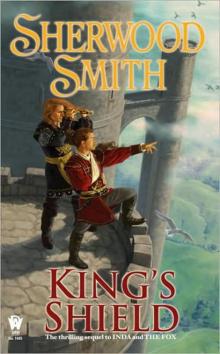 King's Shield
King's Shield Whispered Magics
Whispered Magics Fleeing Peace
Fleeing Peace Barefoot Pirate
Barefoot Pirate Crown Duel
Crown Duel Mearsies Heili Bounces Back
Mearsies Heili Bounces Back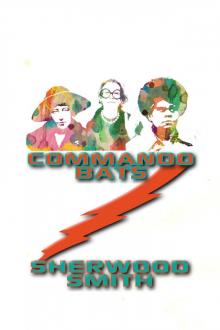 Commando Bats
Commando Bats A Stranger to Command
A Stranger to Command Lhind the Spy
Lhind the Spy The Spy Princess
The Spy Princess Blood Spirits
Blood Spirits Sasharia en Garde
Sasharia en Garde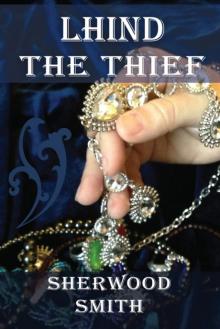 Lhind the Thief
Lhind the Thief Paradise Drift
Paradise Drift Banner of the Damned
Banner of the Damned The Trouble With Kings
The Trouble With Kings Poor World
Poor World Treason's Shore
Treason's Shore Wren Journeymage
Wren Journeymage A Posse of Princesses
A Posse of Princesses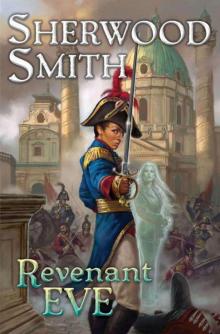 Revenant Eve
Revenant Eve Once a Princess
Once a Princess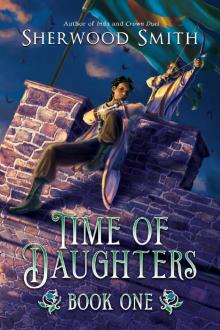 Time of Daughters I
Time of Daughters I Rondo Allegro
Rondo Allegro Coronets and Steel
Coronets and Steel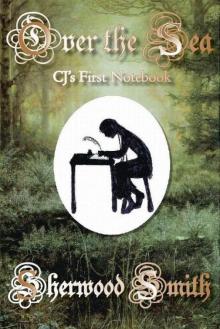 Over the Sea
Over the Sea Senrid
Senrid Hunt Across Worlds
Hunt Across Worlds A Sword Named Truth
A Sword Named Truth The Fox
The Fox Twice a Prince
Twice a Prince Fair Winds and Homeward Sail: Sophy Croft's Story
Fair Winds and Homeward Sail: Sophy Croft's Story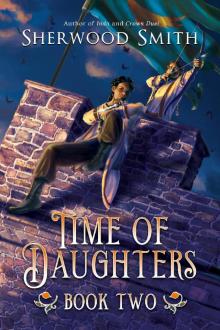 Time of Daughters II
Time of Daughters II The Rifter's Covenant
The Rifter's Covenant The Phoenix in Flight
The Phoenix in Flight Stranger
Stranger The Thrones of Kronos
The Thrones of Kronos A Prison Unsought
A Prison Unsought Twice a Prince: Sasharia En Garde Book 2
Twice a Prince: Sasharia En Garde Book 2